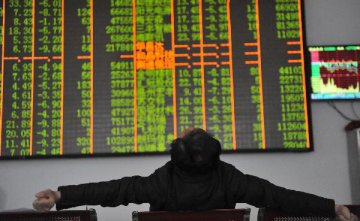
Solutions adopted by some countries and regions:
Hong Kong Monetary Authority (HKMA) sold US dollars and bought 2.159 billion Hong Kong dollars in the morning of August 15.
Bank Indonesia raised the benchmark interest rate for 7-day reverse repo by 25 basis points to 5.5 percent on August 15.
Central Bank of Argentina raised the benchmark rate by 5 percent this week.
Turkey raised tariffs significantly on some American imports on the same day.
The global foreign currency market continued to tumble and Turkish lira risk stirred up the global market.
The US dollar index surged again on August 15 and even came close to 97 during trading hours, hitting a new peak since the end of last June. Hit by the strong US dollar, exchange rate of HK dollar against the US dollar reached the weaker 7.85 for several times in 6 consecutive trading days since August 9. HKMA once again stepped in to defend exchange rate of HK dollar after a three-month hiatus by selling US dollars and buying 2.159 billion HK dollars on August 15. The exchange rate still fluctuated around the weaker exchange guarantee level.
At the same day, exchange rate of onshore renminbi against US dollar declined to 6.91 and then picked up. It finally settled at 6.9049, hitting new low over the past 15 months. That of offshore RMB against US dollar had moved above 6.94, down by over 400 points at most.
Expansion in interest rate spread between US dollar and HK dollar
HK dollar exchange rate against US dollar reached weaker exchange guarantee level
HKMA vice president Li Dazhi said that HK dollar exchange rate shed and reached the weaker exchange guarantee level due to decreasing demand for HK dollars, expanding interest rate spread between US dollar and HK dollar and capitals outflow from Hong Kong after large fundraising activities by floating shares ended.
Yuan Yacheng, senior researcher from China Minsheng Bank, considered that one of the reasons for weak HK dollar exchange rate is slowdown in Hong Kong economic growth in the second quarter. Secondly, as the US placed economic sanctions on many countries and the Federal Reserve raised interest rate, more capitals flew out from emerging countries.
According to Wind Info, the capitals raised through floating shares in Hong Kong surged remarkably to 66.823 billion HK dollars in July, higher than the total amount in the first six months. This is the largest contributor to capital outflow from Hong Kong.
There have been a total of 7 interest rate hikes by the Fed since December of 2015. Yuan predicted that there may be another one or two hikes this year and the US dollar is likely to get stronger. This will lead to further expansion in interest rate spread between US dollar and HK dollar and the latter still faces pressure for depreciation.
Wang Xinjie, chief investment strategist for Standard Chartered Bank, said that the HKMA had enough reserve tools to use and the turbulence of HK dollar exchange rate is unlikely to give rise to bigger risk.
HKMA added that it is able to maintain HK dollar exchange rate stable and deal with large-scale capital flow.
Various economies take measures to fight against the strong US dollar
Recently, exchange rate of Turkish lira slid sharply against the US dollar and accordingly the US dollar index hit a new high. Driven by emotion of risk aversion, currencies of many emerging countries, such as Turkish lira, South African Rand, Argentine Peso and Indonesian rupiah suffered huge loss.
Monetary authorities of many emerging countries began to take actions in recent two days.
Bank Indonesia raised the benchmark interest rate for 7-day reverse repo by 25 basis points to 5.5 percent on August 15. Central Bank of Argentina pushed up the benchmark rate by 5 percent this week.
Turkey raised tariffs significantly on some American imports covering passenger vehicle, tobacco and alcohol and cosmetics so as to counter back trade sanctions of the US. Exchange rate of Turkish lira against US dollar rebounded in the afternoon of August 15.
Cheng Shi, chief economist of ICBC International, and others pointed out the latest report that rapid depreciation of currencies of many emerging markets was not a surprise. The weak fundamental is the drive for violent fluctuation in their currency value. Taking Turkey for instance, the drastic depreciation lately is merely a result of imbalance in economy and loose monetary policy, which the country has been faced with for a long time.
Yi Nan, a senior researcher with China Minsheng Bank Research Institute, said that in general, the depreciation of emerging market currencies will lead to a rise in investor risk aversion and capital return to developed markets.
Market analysts said that the flow of capital back to the US further boosts the rise of the US dollar index.
Cheng Shi stressed that the sharp depreciation of emerging market currencies has a negative spillover effect on global financial markets, but it is relatively limited. Investors should be wary that these “dangerous currencies” may affect global financial markets through emotional transmission and risk spillovers.
Yi Nan believes that the US dollar index is likely to fluctuate at a high level. As Turkey and the US are expected to negotiate, the Turkish storm will ease. However, given the problems and sporadic factors in emerging market economies, financial markets may continue to be volatile in the short term.
Translated by Vanessa Chen & Coral Zhong






















Latest comments